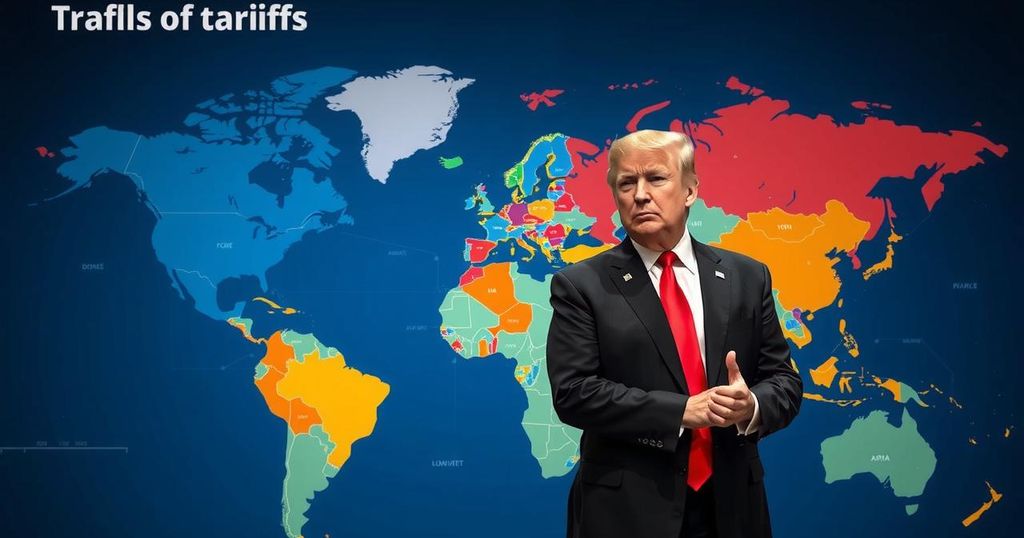Trump’s Threat of 100% Tariff on BRICS Nations: Implications and Context

President-elect Trump threatened a 100% tariff on BRICS nations to deter them from developing alternative currencies to the U.S. dollar. This warning follows previous tariff threats against Canada, Mexico, and China and reflects BRICS countries’ ongoing push for a common currency to reduce dollar dependence. Economists argue the feasibility of this alternative currency remains doubtful, as the dollar continues to dominate global trade.
On November 30, President-elect Donald Trump issued a stern warning of a potential 100% tariff on a collective of nations known as the BRICS if they attempt to establish a currency that could rival the U.S. dollar. The BRICS nations, which include Brazil, Russia, India, China, South Africa, Egypt, Ethiopia, Iran, and the United Arab Emirates, were cautioned not to pursue the development or endorsement of an alternative currency. Trump articulated his demands through social media, asserting that failure to comply could jeopardize their economic exchanges with the United States: “We require a commitment from these Countries that they will neither create a new BRICS Currency, nor back any other Currency to replace the mighty U.S. Dollar or, they will face 100% Tariffs.”
This aggressive stance follows Trump’s earlier threats to impose tariffs on Canada, Mexico, and China in an effort to compel those nations to take action against unauthorized migration and illicit drug trafficking. The BRICS alliance was initially formed in 2009 to promote the interests of emerging economies and reduce reliance on the U.S. dollar, which currently enjoys a dominant position in international trade, providing significant advantages to the United States.
Recently, calls from Russian President Vladimir Putin for a new payments system, as well as Brazilian President Luiz Inácio Lula da Silva’s plans for a common currency in South America, underscore the desire among BRICS nations to diminish dollar dependency. However, economists argue that creating a new reserve currency is a formidable challenge and lacks feasibility in the near future due to the dollar’s established global trust and stability. Mark Weinstock, an expert in global trade, stated: “Economically, it’s not a major issue because the idea of the BRICS countries being able to put together an alternative as a reserve currency for the U.S. dollar is not plausible in the short or intermediate term.”
Some BRICS members have attempted to alleviate concerns regarding the establishment of a new currency. Following Trump’s tariff threat, South Africa’s government clarified that there are no ongoing plans to create a BRICS currency. Their official statement emphasized that current discussions prioritize trade among members using their own respective national currencies.
Should Trump’s threatened tariffs be realized, the implications for U.S. consumers could be dire, as they would likely result in escalated prices for imported goods, contributing to inflation. Experts concur that such tariffs would lead to increased costs for items ranging from Brazilian coffee to electronics from China, which would ultimately burden American consumers.
Critics have voiced concerns regarding the overarching implications of Trump’s threats, suggesting that it casts the U.S. in a position of vulnerability. Brad Setser of the Council on Foreign Relations articulated that the effort to compel countries to adhere to dollar reliance could, paradoxically, expedite a transition away from the dollar’s preeminence on the global stage: “It makes the use of the dollar appear to be a favor to the U.S.”.
The BRICS alliance, comprising Brazil, Russia, India, China, and South Africa alongside recently added members Egypt, Ethiopia, Iran, and the United Arab Emirates, was formed to advocate for the interests of emerging economies. These nations seek to decrease their dependence on the U.S. dollar, which holds a dominant position in global commerce, and by doing so, they aim to enhance their own economic autonomy. The dollar’s extensive use provides significant advantages to the United States, such as lower borrowing costs and substantial geopolitical power. Calls from BRICS leaders for alternative currencies reflect ongoing discontent with the dollar’s global usage.
In summary, President Trump’s warning of a 100% tariff on BRICS nations serves as a strategic maneuver aimed at safeguarding the U.S. dollar’s supremacy in global trade. This situation highlights the BRICS countries’ ambition to establish independence from the dollar, though many experts maintain that they will face significant challenges in developing a viable alternative. Such tariffs would likely have detrimental effects on U.S. consumers, potentially escalating prices for a variety of imported goods. Moreover, criticisms of Trump’s threats suggest he may inadvertently undermine the dollar’s standing by making it appear dispensable.
Original Source: www.cbsnews.com








